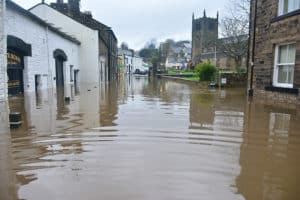Click here to get this post in PDF

I was chatting with a friend the other day and she happened to mention that she had spent the afternoon with her lawyer discussing what she would do if her business was struck by a natural disaster. Of course, she has business insurance, and is also covered through her rental agreement for the leasehold she has on her business property, but the business itself relies on foot traffic and she was worried what might happen if a hurricane, tornado, or even freak snowstorm wiped out her power, trafficways, or even God forbid, her building altogether! It got me thinking about what other businesses owners do in the face of disaster, and I thought it prudent to provide this short guide and checklist for small business owners out there who might face similar threats.
Triple Check Your Insurance Policy
One of the first things you need to do in order to determine if your business is prepared for a natural disaster is to check the fine print of your insurance policy and then check it again. If you have questions about anything – anything – do not hesitate to call your insurance broker and dig into those questions. Misunderstanding happens all of the time, especially where it is not actually the desire of the insurance company to pay out for damages and claims. While insurance coverage is there to help you during times of crisis, insurance companies are not keen on handing over wads of cash in the event of a natural disaster.
Take a Proper Inventory
While working with your insurance company to update your policies, make sure you have an accurate count of inventory or regular stores of inventory. Get all of your equipment and materials on a spreadsheet and save them in the Cloud so you can access them from anywhere you need to. This is especially important if your business is physically damaged during a natural disaster and you can’t get to your location for whatever reason. Don’t forget to do a digital inventory as well – having a small business disaster IT recovery plan can help ensure that you don’t lose valuable data or compromise your data during a natural disaster. We often take these things for granted because so much “lives on the internet” but if you aren’t backing up your files, or pushing them to the Cloud, you might not have anything to return to following a storm or disaster.
Consult with Your Employees
It’s always a good idea to talk to your employees about contingency plans and how you can handle the business in the event of a natural disaster. Here are some questions you may need to answer for, or with, your employees:
- Are employees expected or required to show up for work?
- Can they work remotely?
- Do you even want them there?
- Who is the first person on the scene?
- Is there a fanout sheet that requires employees to contact one another, or will you converse with employees via email or text?
- Who is responsible for what during an emergency situation?
- What is the return-to-work plan following a disaster?
Check Your Finances
One final thing that you need to consider when planning for a natural disaster response in your business is your finances. Some of the questions you might ask yourself when planning include:
- How much working capital do you have on hand?
- What other sources of funding or capital can you quickly obtain?
- What assets do you have that would provide income?
- What insurance coverage or policies do you have to ensure coverage of lost wages or income for yourself?
- Is there an unemployment program in your area for small business owners?
- How long can you continue to operate without income from your business?
Nobody likes to think that bad things can happen, but they do happen. It’s important for small business owners to take the time to do some disaster planning to ensure that they are not left out in the cold following a storm. A few phone calls, maybe a couple of meetings, and an action plan are all that stand between you and chaos following a natural disaster. Put your mind at ease. Take it from my friend, having these tough conversations now can really make you feel like you are protecting what’s important to you now and in the future.
You may also like: The Importance of Disaster Preparedness for a Small Business

[…] You may also like: Is Your Business Prepared for a Natural Disaster? […]